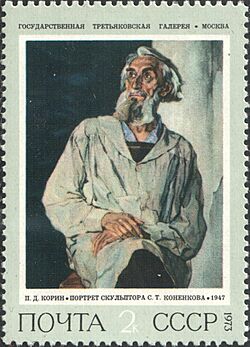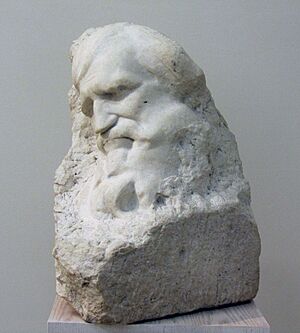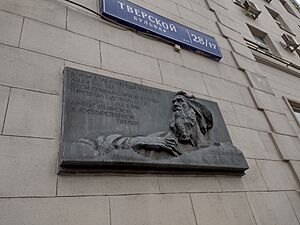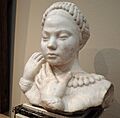Sergey Konenkov facts for kids
Quick facts for kids
Sergey Konenkov
|
|
|---|---|
| Сергей Тимофеевич Конёнков | |

Picture of Sergey Konenkov on USSR stamp
|
|
| Born | July 10, 1874 Karakovichi, Smolensk Governorate, Russian Empire
|
| Died | December 9, 1971 (aged 97) Moscow, Russian SFSR, Soviet Union
|
| Resting place | Novodevichy Convent |
| Nationality | Russian |
| Education | Moscow School of Painting, Sculpture and Architecture |
| Alma mater | St. Petersburg Academy of Arts |
| Known for | Sculptor |
| Spouse(s) | Margarita Ivanovna Vorontsova |
| Awards | Golden star of the Hero of Socialist Labour |
Sergey Timofeyevich Konenkov (born July 10, 1874 – died December 9, 1971) was a very famous Russian and Soviet sculptor. People sometimes called him "the Russian Rodin". This was because he was as talented as the famous French sculptor Auguste Rodin.
Contents
Early Life and Art Education
Sergey Konenkov grew up in a farming family in a village called Karakovichi. This village was in the Smolensk region of Russia. He loved art and studied at two big art schools. First, he went to the Moscow School of Painting, Sculpture and Architecture. He finished there in 1897. Then, he studied at the St. Petersburg Academy of Arts.
For his final project at the Academy, he made a giant clay statue of Samson. Samson was a strong hero from old stories. This statue was very different from what his teachers expected. They even broke it because it didn't follow the old rules of art!
Travels and Early Career
After his studies, Konenkov traveled a lot. He visited many countries like Italy, France, Egypt, Greece, and Germany. These trips helped him see different kinds of art.
In 1905, there was a big event called the Russian Revolution of 1905. Konenkov supported the workers who were fighting for change. He even made sculptures of the people who were heroes during this time in Moscow.
Konenkov also sold some of his sculptures to a famous art collector named Ivan Morozov. One of his wooden carvings was called Young Woman.
Supporting the Revolution
Konenkov strongly supported the Russian Revolution of 1917. This was when the Bolsheviks took power in Russia. After the revolution, Konenkov started working for a new government group called Narkompros. This group was in charge of education and culture. He even went back to Ivan Morozov's house to make sure his art collection was protected.
Life and Work in America
In 1922, Konenkov married Margarita Ivanovna Vorontsova. The next year, in 1923, they traveled to the United States. They went there for a special Russian Art Exhibition in New York City. The trip was only supposed to last a few months. But Konenkov and Margarita ended up staying in the United States for 22 years! They lived and worked in New York City.
During his time in America, Konenkov made many sculptures about the Bible. He created art showing Jesus Christ and other important figures from Christianity.
In 1935, Princeton University asked him to create a sculpture of the famous scientist Albert Einstein. Einstein was interested in Konenkov's art. He also became friends with Konenkov's wife, Margarita.
Return to Russia
In 1945, the leader of the Soviet Union, Joseph Stalin, personally ordered a ship to bring Konenkov back to the USSR. When he returned, Konenkov was given a large art studio in the center of Moscow. This showed that the government liked his work. He even helped design a special plaque for the Kremlin.
Konenkov created sculptures of many famous people. These included writers like Aleksandr Pushkin, Anton Chekhov, and Leo Tolstoy. He also sculpted scientists like Konstantin Tsiolkovsky and musicians like Johann Bach. He also made special wooden crosses and other art for a convent in Moscow.
Konenkov received many important awards from the Soviet government. These included the "Golden Star of the Hero of Socialist Labour" and the "Order of Lenin". He was also given the title "Peoples Artist of the USSR".
Sergey Konenkov passed away in 1971. He is buried in Moscow's Novodevichy Convent. A street in Moscow is named after him to honor his work.
Famous Sculptures
See also
- List of Russian artists
 | Lonnie Johnson |
 | Granville Woods |
 | Lewis Howard Latimer |
 | James West |






